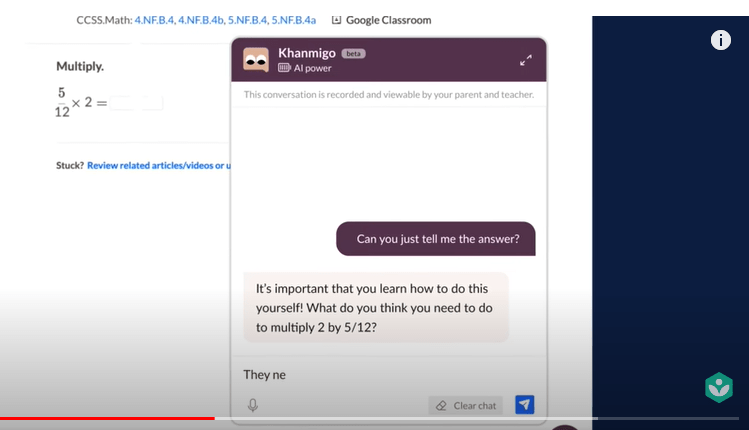Khan Academy, which began as a project by its founder, Sal Khan, to bring free internet tutelage to schoolchildren, then got in bed with College Board and the SAT suite of products (yes, that’s how College Board refers to it,) by providing a customized path of review based upon PSAT results, is now trumpeting its latest venture.
Khan Academy has met Artificial Intelligence.
One supposes the name is a combination of Khan and amigo, the Spanish word for friend. But this may not be anybody’s friend as one of its supposed benefits is that Khanmigo will do lesson planning for teachers. However, Sal should learn that lesson planning for teachers in most districts is a cut-and-paste job into mandated templates. No intelligence, artificial or otherwise, is needed for that. (Not saying that is real lesson planning, but it is what passes for it these days.)
Sal also tells us that AI is already embedded in everything that Khan Academy does, for example, giving hints to help students solve problems. He insists that the AI will assist students in finding answers and will not be a vehicle for cheating.

Sal goes on to claim that he is helping students emerge from the pandemic and connecting their learning to what’s going on in the classroom. To his credit, he does not use the phrase learning loss.
“What if, when writing a story, the AI works with the student to write the story, not for the student, but alongside them making sure the student is doing the bulk of the work but pulling the story out of them? Making it more fun, making it more engaging …”
(Mr. Fitz, if nothing else, Sal is creating a great story line for your next series of strips.)
Khanmigo is in beta testing as they are working with districts and schools who already are joined to their ecosystem of teaching videos, exercises, and tests. The problem with Khan Academy is the same problem every edutech product, free or other wise, has. The pathway is prescribed and unaltered. What happens when a student doesn’t understand the video, can’t solve the problems, or answer the questions correctly?
All they can do with edutech is rewatch the video and try again. Yet, as every teacher has been told repeatedly in observations, if the students didn’t learn from your lesson, why would you reteach it the exact same way? You have to do it different as the first time didn’t work.
But all edutech can do is offer the same teaching approach over and over. Khanmigo’s promise is that its AI engine (a GPT-4 based product) will overcome that limitation.
That has yet to be seen as well as whether its safety features are effective. In the presentation, Sal tells us that teachers and schools will be able to review student’s interaction with the AI bot. Inappropriate chats or those ‘on the edge’ will be flagged.
Sal gave a TED talk about it:
Lots of promises for what really is Sal Khan and his website getting on the AI/Chatbot bandwagon. What I’m reminded of is Japanese teaching robots that were supposed to replace real human teachers.
Did he really just say that his product can replace a school counselor? Yes, he did.
There’s a 21 minute, more in-depth video to demonstrate the product, but I have seen enough.
GPT chatbots, a/k/a artificial intelligence, may find a use within our virtual world that most of us participate in. But the problems, no better illustrated than the rebuke a New York judge issued to an attorney who used ChatGPT to cite precedents, but oops! the AI made everything up, would indicate not.
AI, chatbots, and the like are the latest technofad and will fade much as pet rocks had their day in the late 1970s.
